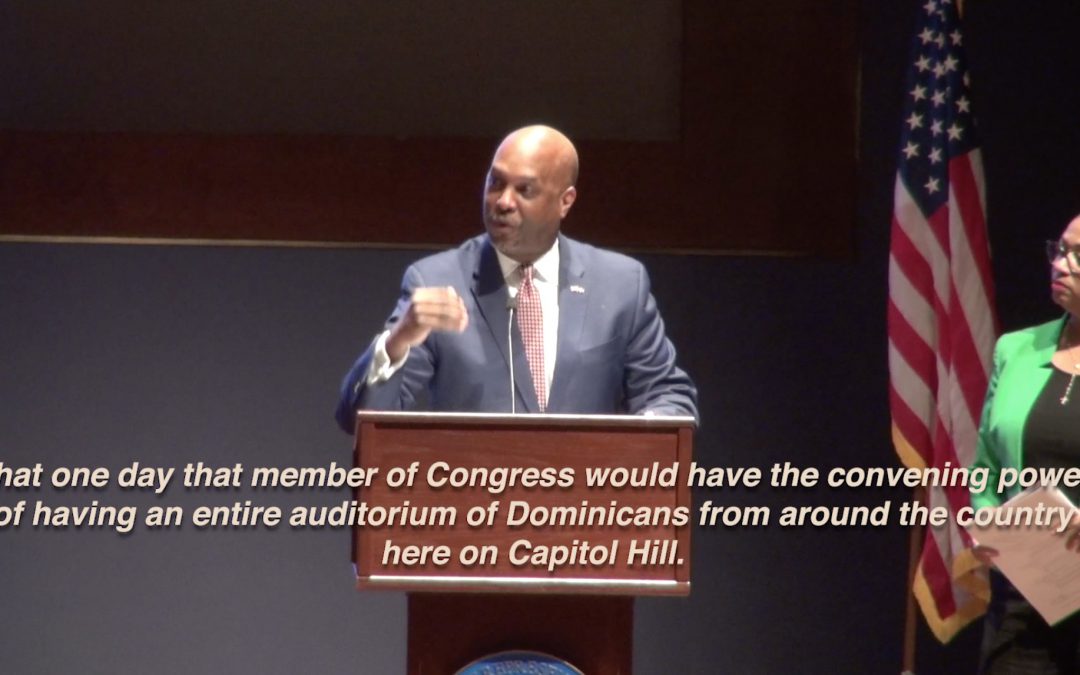The first former undocumented immigrant and first Dominican-American in Congress, Rep. Adriano Espaillat, D-N.Y., hosted the first Dominicans on the Hill event last week. He brought Dominicans from across the country to “highlight to members of Congress how many Dominicans and Dominican Americans there are in their districts, ” and how their presence ties into larger conversations about immigration in the U.S.
“The timing is right,” said Espaillat, noting that a delayed State of the Union ended up being well-timed with this pre-planned event. “Immigration will obviously have a keen interest among the participants because many folks came here undocumented or many folks are still trying to reunite with their families or are in transition with regards to their DACA status.”
Trump used much of his second State of the Union address to defend his border security and immigration policies. Trump’s invited guests served as human examples to reinforce his message.
Immigration expert Asad L. Asad took particular interest in Trump’s guest Elvin Hernandez, an Immigration and Customs Enforcement officer who migrated to the United States from the Dominican Republic. Asad views Trump’s shout out to Hernandez as a wink to supporters.
“It’s meant to be a symbolic gesture that shows even people in this community want what Trump is selling,” Asad said. “It’s all about optics.”
According to Asad, Hernandez’s story of legal migration is an unfair example of a model migrant story when compared to migrants crossing the southern border. The scholar said the demand for U.S.-bound migration is higher in Mexico than in the Dominican Republic, and this makes it easier for Dominican migrants to obtain visas to the United States.
In 2018, the U.S. Department of State issued 46,334 immediate relative visas to Mexican nationals. The same year, the department issued less than half of the same visas to Dominican Republic nationals —18,595.
According to analysts, many Dominicans migrate to reunite with family members that have already moved to the United States.
Like Trump, Democrats invited guests to serve as reminders to policy issues not addressed during the speech, such as the recent federal shutdown, Deferred Action for Childhood Arrivals and sexual assault survivors.
Yeni Gonzalez Garcia, a mother who was separated from her three children at the U.S. border accompanied Espaillat.
With the help of Espaillat, Gonzalez Garcia was reunited with her three children — ages 7, 10, and 12. Gonzalez Garcia’s lawyer, Jose Xavier Orochena, accompanied her and her children to Washington, D.C. for the speech.
Xavier Orochena said Gonzalez Garcia has applied for asylum, but he has concerns about the State of the Union address’ impact on pending and future asylum applications. He questions whether the requirement to adjudicate migrant families’ immigration cases within 365 days violated Gonzalez Garcia’s due process rights. The new case requirements speed up the legal proceedings.
“Some of the applications that we have to apply for take months,” Xavier Orochena said. “So now we’re being given a time frame that is just unreasonable.”
As the whip for the House Hispanic Caucus, Espaillat has legislative influence within the group. Following the State of the Union, Espaillat and other members of his caucus reintroduced three bills related to immigration — the Protecting Sensitive Locations Act, the Reunite Every Unaccompanied Newborn Infant Toddler and Other Children Expeditiously (REUNITE) Act and the ICE and CBP Body Camera Accountability Act.
The first measure seeks to prohibit immigration enforcement in courthouses, schools, community centers, and houses of worship. The second law would require the immediate reunification of children who were separated from their parent or legal guardian at the southern border. The third bill would require Immigration and Customs Enforcement and Customs and Border Patrol officers to wear body cameras and would make footage available for any legal proceedings.
“President Trump has made the targeting of immigrants a central part of his administration’s policies while persistently lobbing bigoted, verbal attacks at immigrant communities,” said Espaillat in a press release. “What we witnessed during the State of the Union address was more of the same – criminalizing immigrants, promoting inhumane policies that separate children from their families, and raid sensitive locations such as public schools and courthouses.
Other lawmakers in attendance at the Dominicans on the Hill event echoed Espaillat’s SOTU reaction.
“We are all Americans too. And this is something the president might not agree on,” said Rep. Grace Meng, D-N.Y.

